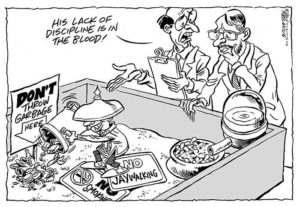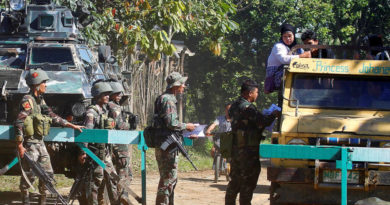EDITORIAL CARTOONS: MANILA- Hong Kong folk have a lot to teach us
HK folk have a lot to teach us
Filipinos have long had a “love-hate affair” with Hong Kong. For many middle- and upper-class and even budget millennial Pinoy travelers, the once Crown Colony is almost always the first foreign destination they travel to. Just about an hour’s flight away, it offers Filipino travelers a convenient yet exotic place to visit, shop in and drink in the sights.
But at the same time, travelers there come back home with stories of rude shopkeepers, indifferent fellow commuters, and a cold, unfeeling culture amid the skyscrapers and theme parks. The influx of overseas Filipino workers to Hong Kong, many of them female domestic workers, has altered the balance somewhat, with Pinoy tourists feeling an intense tug-of-war between pride and shame. There is pride in how Hong Kong families have come to rely on their Filipina domestic workers to look after their homes and families. But there is also some shame in the poverty and desperation that have driven thousands of them away from home.
ADS by Cloud 9:
.
– SPACE RESERVE FOR YOUR ADVERTISEMENT –

Recent events, though, have forged a kind of kinship between Filipinos and the people of Hong Kong. It is the shared experience of challenging a powerful and indeed oppressive government by sheer force of the people’s will, expressed through street protests and sustained mass action. Filipinos had our day in the international spotlight when in 1986 an estimated million people gathered on Edsa (with many more massed in provincial cities and capitals), initially to protect a group of military renegades but ultimately succeeding a few days later in sending the dictator Marcos and his family and cronies into exile.
ADS by Cloud 9:
.
– SPACE RESERVE FOR YOUR ADVERTISEMENT –

These days, the world’s attention is turned to Hong Kong, where, for nearly three months, citizens of the tiny city—many of them students—have massed on the streets to press their demands.
The protests were provoked by an extradition bill that would have allowed China to arrest and bring before mainland courts crime suspects and even protest leaders. Initially, Hong Kong chief executive Carrie Lam said she and the local government would simply shelve the measure for further discussion. But after sustained protests that had grown not just in number but in intensity, Lam recently announced that she was withdrawing the extradition bill for good.
Though withdrawal of the bill was the premier demand of Hong Kong’s amorphous, seemingly leaderless protests, the list of demands has grown to include an independent investigation into the violent police response to the protests (use of tear gas even in the subway, armed attacks by goons wearing masks), amnesty for arrested protesters, and direct elections for all lawmakers and the chief executive. Thus, the protesters remain defiant and unmoved.
ADS by Cloud 9:
.
– SPACE RESERVE FOR YOUR ADVERTISEMENT –

After Lam’s videotaped announcement, in fact, two masked protesters held a “civilians’ press conference” outside the venue, calling the withdrawal of the bill “a band-aid on rotting flesh” and reiterating their calls that “five demands, not one less” be met.
Some have said Lam’s belated concession was a hint of some kind of “softening” on Beijing’s part. But the protesters’ indifferent, indeed scornful, reaction may have caught the mandarins in Beijing by surprise; clearly, the situation has gone beyond the big issue whose early resolution the Chinese government had botched with its ham-handed response of both contempt and violence, leading to the escalation of public fury.
ADS by Cloud 9:
.
– SPACE RESERVE FOR YOUR ADVERTISEMENT –

For many years, we Filipinos have held our heads high, boosted by the bragging rights that a successful culmination of the Edsa “People Power” uprising bestowed. These days, our hubris has taken more than a little beating, and doubtless our abject foreign policy—illustrated by the latest tête-à-tête between Presidents Duterte and Xi Jinping, which saw our leader surprisingly contrite in bringing up the arbitral ruling that invalidated China’s claim over the South China Sea and backed the Philippine position instead—has a lot to do with it.
What happened to us in the meanwhile? How have we let repeated blows to our national dignity go unanswered and indeed even accepted with alacrity, if not obsequious ass-licking?
Citizens everywhere, but especially Filipinos restive over authoritarian China’s growing hold on their government, have a lot to learn from the people of Hong Kong. Gathering by the millions, filling up the streets of their bustling city, the protesters have shown how, with courage and persistence, an aroused people can fight for their rights and their way of life with determination and spunk, challenging the great power that has cast its shadow over their little city-state.
Philippine Daily Inquirer / 05:12 AM September 07, 2019
ADS by Cloud 9:
.
– SPACE RESERVE FOR YOUR ADVERTISEMENT –


> A loathsome practice
# MANILA TIMES
> Lack of discippline
ADS by Cloud 9:
.
– SPACE RESERVE FOR YOUR ADVERTISEMENT –

P.D.INQUIRER
> HK folk have a lot to teach us
> No end to red tape
ADS by Cloud 9:
.
– SPACE RESERVE FOR YOUR ADVERTISEMENT –

PILIPINO STAR NGAYON

> Imbestigahan din iba pang ex-BuCor chiefs…
.
The Straits Times
The Straits Times says
Capital’s move can be a good thing
The reception to Indonesian President Joko Widodo’s plan to move the country’s capital from Jakarta to East Kalimantan has been mixed. A nationwide survey last month showed that 39.8 per cent of respondents disapproved of it, while 35.6 per cent backed it. Commentators have made understanding noises about the many problems faced by Jakarta as capital of South-east Asia’s most populous country of 260 million. But many have asked whether it would be better to spend the money to fix the problems of the metropolis – traffic gridlock, air pollution, subsidence and flooding, overcrowding – rather than on building a new city. After all, moving 1.5 million people from the city of 10 million (nearly 30 million if the metropolitan area is included) will do little to solve its issues. It could, instead, bring a whole host of problems such as possible environmental damage to the pristine forests of East Kalimantan.
ADS by Cloud 9:
.
– SPACE RESERVE FOR YOUR ADVERTISEMENT –

Yet, there are persuasive arguments for the move. Apart from easing the problems of Jakarta, a more compelling reason for shifting the capital is that it could help foster more balanced development in the sprawling archipelago. Right now, Java island on which Jakarta is located is home to 54 per cent of the country’s population and produces 58 per cent of its gross domestic product, with Jakarta alone making up 20 per cent. Yet, Java is the smallest of Indonesia’s five major islands, accounting for only 7.9 per cent of its total land area. By moving the capital north-eastwards, Mr Joko is hoping to boost the economic development of the underdeveloped eastern regions which have seen unrest, including recent protests in West Papua. Said Mr Joko of the move: “This is for the realisation of economic equality and justice.” Certainly, Indonesians outside Java welcome it. Last month’s survey showed that 48 per cent of respondents in Kalimantan approved of it, with 29 per cent opposed to it. Tellingly, the highest support of 68 per cent came from the less-developed island of Sulawesi, which is close to East Kalimantan and therefore expects to gain economically.
TO READ THE FULL ARTICLE: https://www.straitstimes.com/opinion/st-editorial/capitals-move-can-be-a-good-thing
ADS by Cloud 9:
.
– SPACE RESERVE FOR YOUR ADVERTISEMENT –

.
 All photographs, news, editorials, opinions, information, data, others have been taken from the Internet ..aseanews.net | [email protected]
All photographs, news, editorials, opinions, information, data, others have been taken from the Internet ..aseanews.net | [email protected]
For comments, Email to :D’Equalizer | [email protected] | Contributor













